In the kaleidoscope of literary luminaries, Kurt Vonnegut’s name gleams brightly, a beacon for readers seeking profound insights wrapped in wry humor.
As we delve into the 10 best books by Kurt Vonnegut, prepare to embark on a journey through worlds that are simultaneously satirical, poignant, and mind-bending.
From Slaughterhouse-Five to Cat’s Cradle, Vonnegut’s narrative prowess has left an indelible mark on the literary landscape.
Who is Kurt Vonnegut?
Kurt Vonnegut, born in 1922, was an American novelist, satirist, and essayist. Known for his distinctive voice and inventive storytelling, Vonnegut crafted narratives that danced on the edge of reality, challenging conventional norms.
His works often traversed the realms of science fiction, black comedy, and social commentary, earning him a dedicated readership. Vonnegut’s writing, characterized by its dry wit and existential ponderings, transcends genres, making him an enduring figure in American literature.
10 Best Books By Kurt Vonnegut
Below are the top 10 best books by Kurt Vonnegut:
1. Slaughterhouse-Five (1969)
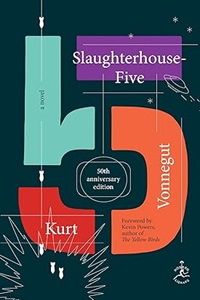
Slaughterhouse-Five, a cornerstone in Vonnegut’s repertoire, catapults readers into the turbulent life of Billy Pilgrim. As an optometrist unstuck in time, Billy witnesses the firebombing of Dresden during World War II, an event that profoundly shapes his existence.
Vonnegut’s masterful use of time-traveling narrative not only encapsulates the absurdity of war but also serves as a poignant exploration of trauma and free will.
The novel’s iconic refrain, “so it goes,” punctuates each death, underscoring the inevitability of mortality. Through the lens of science fiction, Vonnegut delivers a timeless meditation on the human condition.
2. Cat’s Cradle (1963)
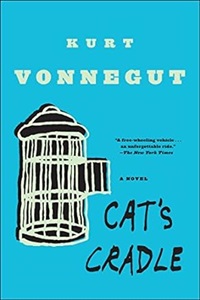
Cat’s Cradle introduces readers to the quirky world of Ice-Nine, a substance with cataclysmic potential. The novel follows John, who sets out to write a book about the creators of the atomic bomb but becomes entangled in a series of bizarre events, leading him to the mysterious island of San Lorenzo.
Vonnegut’s satire tackles the dangers of scientific progress, organized religion, and the elusive nature of truth. The narrative’s humor serves as a Trojan horse, smuggling profound observations about the consequences of human folly into the reader’s psyche. Cat’s Cradle remains a compelling exploration of humanity’s penchant for self-destruction.
3. Mother Night (1961)
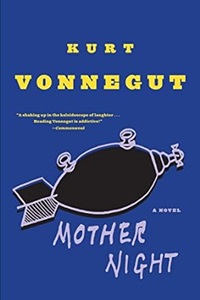
Mother Night thrusts readers into the morally complex world of Howard W. Campbell Jr., an American playwright who becomes a Nazi propagandist during World War II.
As Campbell grapples with his past actions, Vonnegut navigates the murky waters of guilt, responsibility, and the thin line between good and evil. The novel’s structure, presented as Campbell’s memoirs from an Israeli prison, adds layers of complexity to the narrative.
Through Campbell’s introspection, Vonnegut prompts readers to confront the shades of gray within the human soul, questioning the nature of personal accountability in a world fraught with moral ambiguity.
4. Breakfast Of Champions (1973)
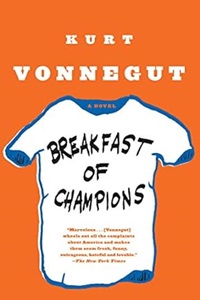
Breakfast of Champions catapults readers into the whimsical yet disconcerting universe of Kilgore Trout, an eccentric and fictional author who discovers the nature of his existence.
Vonnegut takes metafiction to new heights as Trout becomes a pawn in his own creation, questioning the concept of free will and the responsibility of the creator to their creation.
The novel’s irreverent humor masks a deeper exploration of identity, agency, and the consequences of playing god in a world that may be nothing more than a figment of someone else’s imagination.
Vonnegut’s satirical lens unveils the absurdity of the human experience, leaving readers simultaneously amused and contemplative.
5. Player Piano (1952)
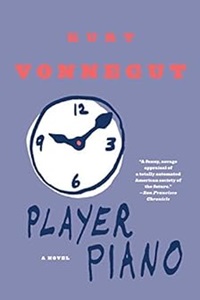
Player Piano, Vonnegut’s debut novel, envisions a dystopian future where automation threatens the very essence of human relevance. The narrative unfolds in a society divided between the elite engineers and the obsolete working class.
Dr. Paul Proteus, an engineer, grapples with the dehumanizing effects of technological progress. Vonnegut’s prescient exploration of the impact of automation on employment, identity, and societal structure resonates in an era increasingly shaped by technological advancements.
The novel serves as a cautionary tale, inviting readers to contemplate the ethical dimensions of progress and the potential consequences of a world where machines usurp the roles traditionally held by humans.
6. Sirens Of Titan (1959)
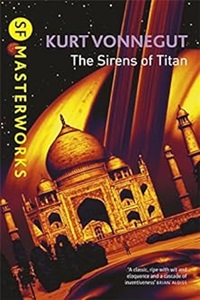
The Sirens of Titan embarks on an interplanetary odyssey with Malachi Constant, a millionaire swept into cosmic misadventures orchestrated by the Tralfamadorians.
Vonnegut navigates the absurdity of human destiny, questioning the nature of free will and predestination. The narrative’s expansive scope weaves together themes of existentialism, fate, and the meaning of life.
Through a blend of satire and speculative fiction, Vonnegut crafts a thought-provoking exploration of the human condition, inviting readers to ponder their place in the vastness of the universe.
7. Slapstick, or Lonesome No More! (1976)
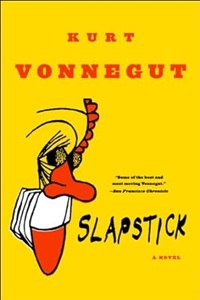
“Slapstick” unfolds in a post-apocalyptic world where Dr. Wilbur Daffodil-11 Swain serves as the last President of the United States. The narrative is characterized by its absurdity and dark humor, as Vonnegut explores the essence of human connection and the pursuit of happiness.
In a world marked by isolation and absurd social structures, Dr. Swain’s journey becomes a reflection on the absurdity of societal norms and the human quest for meaning.
Vonnegut’s satirical lens brings to life a narrative that, despite its surreal elements, offers poignant commentary on the human condition and the enduring need for genuine connections in a world gone awry.
8. God Bless You, Mr. Rosewater (1965)
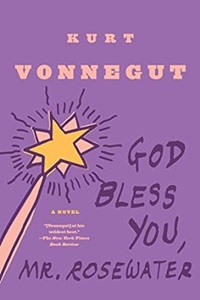
God Bless You, Mr. Rosewater introduces readers to Eliot Rosewater, an eccentric millionaire with a penchant for philanthropy. Vonnegut’s satire dissects the absurdities of societal norms and the pursuit of happiness.
Through Rosewater’s peculiar acts of generosity and the societal backlash they incite, Vonnegut prompts readers to question the true nature of altruism and the societal expectations placed upon the wealthy.
The novel’s humor serves as a Trojan horse, concealing sharp social commentary that challenges readers to reevaluate their own perspectives on wealth, generosity, and the pursuit of a meaningful life.
9. Jailbird (1979)
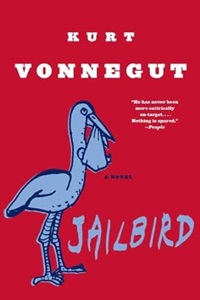
Jailbird unfolds the life of Walter F. Starbuck, a white-collar criminal entangled in political intrigue. Vonnegut’s wit shines as he dissects the American political landscape, blending humor with incisive commentary on power, corruption, and the pursuit of justice.
Through Starbuck’s narrative, the novel becomes a satirical exploration of the absurdities inherent in the pursuit of power and the often comical machinations of those who wield it.
Vonnegut’s ability to infuse serious themes with humor allows readers to engage with the narrative on multiple levels, making Jailbird a compelling and thought-provoking addition to his body of work.
10. Bluebeard (1987)
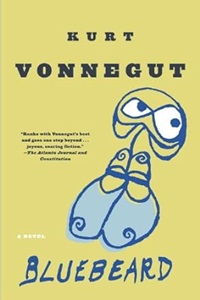
Bluebeard unravels the life of Rabo Karabekian, an eccentric artist with a mysterious past. Vonnegut uses Karabekian’s narrative to explore the nature of creativity, artistic integrity, and the scars of war.
As Karabekian recounts his life and artistic journey, the novel becomes a meditation on the role of art in understanding and coping with the complexities of human existence.
Vonnegut weaves humor and introspection into the narrative, creating a rich tapestry that invites readers to contemplate the intersections of art, trauma, and the search for meaning.
FAQs About Best Books By Kurt Vonnegut
1. What makes Kurt Vonnegut’s writing style unique?
Vonnegut’s writing is characterized by its dry humor, satirical tone, and existential musings, creating a distinctive narrative voice that resonates with readers.
2. Is it necessary to read Vonnegut’s works in a specific order?
While some recurring characters appear in multiple novels, Vonnegut’s works are generally standalone, allowing readers to explore them in any order.
3. What themes are recurrent in Vonnegut’s books?
Themes of war, morality, the absurdity of human existence, and societal critique are prevalent throughout Vonnegut’s body of work.
4. Why is Slaughterhouse-Five often considered Vonnegut’s masterpiece?
Slaughterhouse-Five’s innovative narrative structure, blending science fiction with war commentary, and its timeless exploration of trauma contribute to its acclaim.
5. Which Vonnegut book is recommended for first-time readers?
Slaughterhouse-Five or Cat’s Cradle is often suggested for newcomers, showcasing Vonnegut’s narrative brilliance and thematic richness.
6. Are Vonnegut’s works suitable for all audiences?
While accessible, some of Vonnegut’s themes and language may be better appreciated by mature readers.
7. What impact did Vonnegut have on American literature?
Vonnegut’s bold exploration of unconventional themes and genres challenged literary norms, influencing subsequent generations of writers.
8. Are there adaptations of Vonnegut’s works in other media?
Some of Vonnegut’s novels, including Slaughterhouse-Five and Cat’s Cradle, have been adapted into films, showcasing the enduring appeal of his narratives.
Kurt Vonnegut’s literary legacy endures through the pages of his 10 best works, each a testament to his unparalleled storytelling prowess.
From the existential musings of Slaughterhouse-Five to the societal critiques woven into Breakfast of Champions, Vonnegut’s narratives transcend time, offering readers a mirror to reflect on the complexities of the human experience.
As we traverse the landscapes of his imagination, Vonnegut invites us to question, laugh, and ponder, ensuring his place among the literary titans whose works continue to shape our understanding of the world.
In the realm of American literature, Kurt Vonnegut stands as a luminary whose words continue to echo, inviting new generations to unearth the treasures hidden within the pages of his 10 best books.
